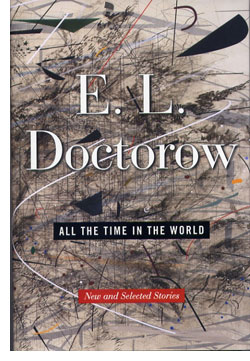 |
 |

E. L. Doctorow
All the Time in the World
Reviewed by: Rick Kleffel © 2011
Random House
US First Edition Hardcover
ISBN 978-1-400-06963-7
Publication Date: 03-22-2011
232 pages; $26
Date Reviewed: 05-20-2011
Index:
General Fiction
Mystery
Fantasy
Science Fiction
We experience life as a narrative — and we're our own protagonists. That sense of struggle separates us from our surroundings, but it is difficult for us to see that separation even though we experience it every moment of our lives. E. L. Doctorow provides the writer's perspective in the stories we find in 'All the Time in the World,' and allows us to perceive what he describes as, "...a situation, with the characters and setting irrevocably attached to it."
Doctorow's collection of short stories explores our world — and some similar — with precise prose and elegant, extended structure. As readers we can, as he puts it in the Preface, "...home in on people who, for one reason or another, are distinct from their surroundings — people who are in some sort of contest with the prevailing world." And while we may not be these characters, Doctorow's clear visions cannot help but give readers insight into their own struggles with the world.
Doctorow is something of a chameleon, or an invisible man. The stories here show a wide variety of styles, and examine characters who are wildly different. No matter what style he adopts, it is the style that best serves the story he is telling. He does not seem to be writing these stories so much as channeling them. The book begins with "Wakefield," a creepy, funny, sweet — you name it, you'll probably find the emotion here — story of a suburbanite who, disrupted form his routine, falls out of his life. How this happens, degree by degree, is fascinatingly believable. How Doctorow handles the story, playing with entropy and order, is remarkable. He manages poetry not just of prose, but plot, as events play out with an almost melodic feel. He leads you to the precipice and then launches you over the cliff. It's exhilarating reading.
This is true for the entire collection, with a wide range of styles. "Edgemont Drive" is a story told in entirely and only in dialogue, with a certain creep factor, about a man who returns to what he claims was his childhood house, now owned by a bickering couple. Stories like "Assimilation" and "Jolene: A Life" manage to have the full feel of a novel, and tell a big story with splendid economy. As readers, we can sense that there is a world, a life, before and after the words we read.
Some stories, like "Liner Notes: The Songs of Billy Bathgate," and "Willi," read closer to prose poetry than straight fiction. The prose voices carry and convey elements that, in other stories in the collection, are handled in plot. Even when he's writing in this style, Doctorow has a light touch. The prose transports us because it is transparent.
With the exception of "Willi," and the title story, these are all quintessentially American stories, and readers will be hard-pressed to escape Doctorow's searing visions. "Walter John Harmon" puts us inside an all-American cult, with the intelligence that let us understand how seemingly bright, normal people can fall for charismatic charlatans. "A House on the Plains" is dark, stark and casually brutal even as it keeps every bit of good, old-fashioned American violence offstage. Equally disturbing, and entertaining is the title story, "All the Time in the World," which offers life as a fractal dream, a future that re-invents itself with every advancing second. Doctorow knows how to pare the words out of the world, and in so doing, he gets uncomfortably close to consciousness.
Taken as a whole, 'All the Time in the World' peels back layer after layer of life, of struggle, of who we are in a series of worlds that reach well beyond the domain of each story. Doctorow lets us get inside the lives of his characters but outside of their perspectives. We can triangulate within these stories to see what lies beyond the edges of what we can read, and in those moments, with that knowledge, see our own struggle, get a measure of our own separation from the world we live in. It's just a moment — and just a world; in that moment, our world.
|
 |
|
|
 |
| |
Review Archive
All Reviews alphabetized by author.
General Fiction
Non-Genre, general fiction and literature.
Horror
Supernatural fiction, supernatural horror and non-supernatural horror.
Science Fiction
Science fiction, science fantasy, speculative fiction, alternate history.
Fantasy
Fantasy, surrealism and magic realism.
Mystery
Crime, thrillers, mystery, suspense.
Non-Fiction
Non-Fiction, True Crime, Forteana, Reference.
Poetry
|
|
 |
|




